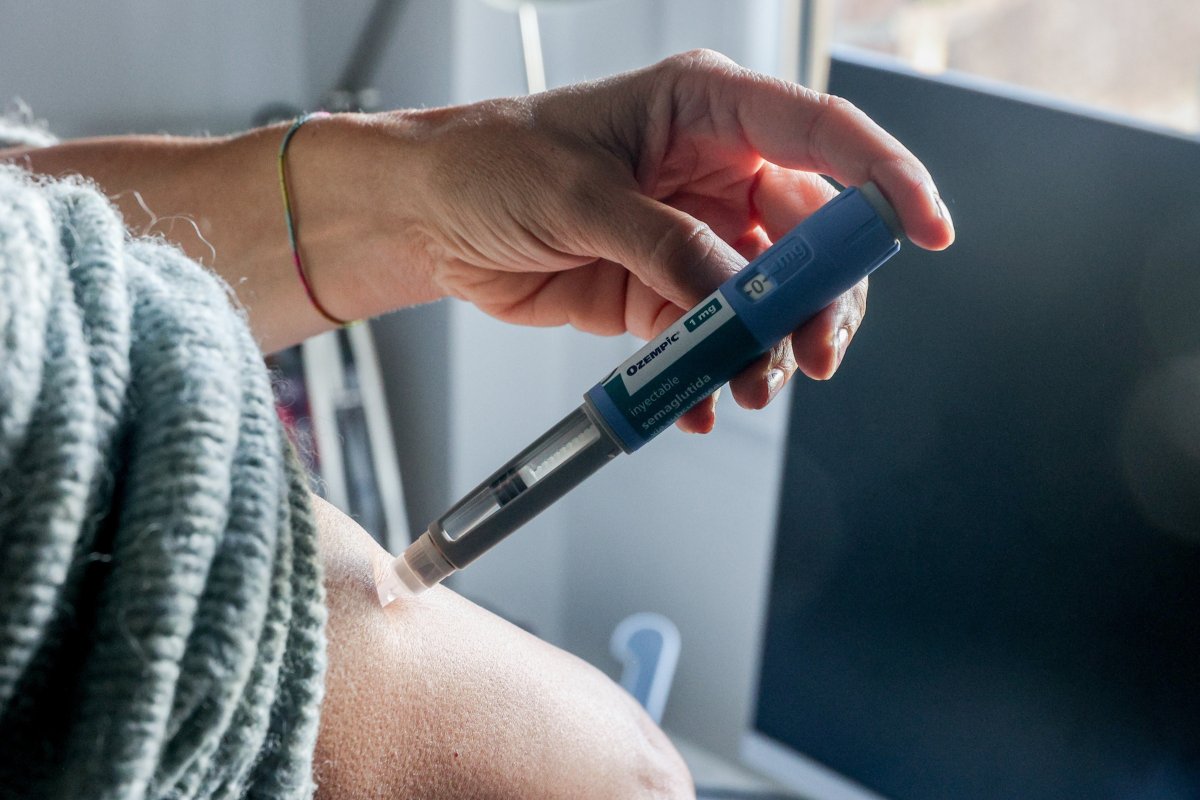[ad_1]
Ozempic has become so strongly associated with celebrity weight loss that it often takes reminding that the pharmaceutical drug was intended for diabetics.
In recent years, celebrities and influencers alike have endorsed the drug as a fat-melting miracle; the hashtag #ozempic has amassed over a billion views on TikTok alone.
Stars have stepped forward to publicly discuss their experiences with Ozempic, subsequently sparking wider public interest in the wonder drug. While that would sound great for business in most other scenarios, the demand has affected access for those who require it for medical purposes.
Ozempic is an injectable prescription drug that is used to manage blood sugar levels in patients with type 2 diabetes. It is based on a naturally occurring human hormone called glucagon-like peptide 1 (GLP-1), which plays an important role in regulating appetite and blood sugar levels.

Photo-illustration by Newsweek/Getty
The active ingredient in Ozempic is a molecule called semaglutide, which acts as a GLP-1 agonist. In other words, it mimics the structure of GLP-1 and activates its receptors. Studies have shown that people with obesity are often less sensitive to the hormones that make them feel full. But by slowing gastric emptying, drugs like Ozempic can restore feelings of fullness in these patients.
Ozempic, manufactured by Danish multinational pharmaceutical company Novo Nordisk, is one of the brand names for semaglutide, which is also known as Wegovy. Unlike Ozempic, Wegovy—which is used off-label for weight loss—is specifically designed to treat obesity. Another popular drug is the tirzepatide Mounjaro, which works to reduce the appetite and better break down sugar and fat.
“So Highly Effective”
Sue Decotiis, a New York City-based medical weight loss doctor, told Newsweek that the drug’s popularity is justified as it’s “so highly effective, not just Ozempic but Mounjaro, which is the newer drug made by [American pharmaceutical company] Eli Lilly. People have gotten such incredible results from these medications.”
“This is the first time just about everybody has gotten results from a medication like this. It got incredible press for that reason, and it just took off because we obviously have a lot of obesity in this country. Even for individuals who are at a normal weight but got older and their hormones change and they aren’t able to lose weight on their own, these drugs come in and lose the weight for them,” Dr. Decotiis said.
“It’s not just about losing body fat and getting lean,” she added. “When insulin is optimized, the drug has multisystem effects. There’s less brain fog, less anxiety, stress, and there’s just all-around widespread effects—decreased cardiovascular risks, heart failure. [These are the] overall positive effects that these medications bring.”
Elon Musk, Whoopi Goldberg, Sharon Osbourne, Amy Schumer, and Tracy Morgan are just some of the familiar names who have spoken about their experiences with taking Ozempic, both good and bad. Oprah Winfrey credited her recent weight loss to the use of an unnamed drug that had been prescribed to her.
Such is its ubiquity that comedian Chelsea Handler once shared in an interview that she didn’t even know she was on the drug during the brief time she took it.
“My anti-aging doctor just hands it out to anybody,” the former Chelsea Lately host said during her appearance on the Call Her Daddy podcast last year. “I didn’t even know I was on it. She said, ‘If you ever want to drop five pounds, this is good.'”
Handler, who eventually stopped taking Ozempic after it left her feeling “nauseous,” added: “I realized I didn’t want to use it because it was silly. It’s for heavy people.”
Cool Image
Carole Lieberman, M.D., a board-certified Beverly Hills psychiatrist, told Newsweek that the drug—which can cost more than $1,000 per month without health insurance—initially signified being part of a cool club in Hollywood.
Read more: Compare Top Health Savings Accounts
“When Ozempic came on the horizon, it seemed like a magic drug, a quick fix that would dissolve fat and end the self-loathing that celebrities, and others with weight problems, have for themselves,” Lieberman said.
“Celebs don’t like to wait for anything—from champagne that takes forever to arrive at their table to diets that take forever to help them arrive at their ideal weight. It was the best-kept secret at first, which added to its coolness. If you got Ozempic, it meant you were in the know.”
Perhaps aiming at the rich and famous who have leaned on diabetes medication to shrink their waistlines, Eli Lilly—which manufactures Mounjaro and weight loss drug Zepbound—launched a pointed television ad days before this year’s Academy Awards.

Ricardo Rubio/Europa Press via Getty Images
The ad showed scenes that would typify Hollywood glamour: red carpets, photographers, and a woman laying out a glittering gown.
“Some people have been using medicine never meant for them for the smaller dress or tux, for a big night, for vanity,” a narrator said in the ad. “But that’s not the point.”
As the visuals cut to a casually dressed woman riding public transportation, the narrator continued, “People whose health is affected by obesity are the reason we work on these medications. It matters who gets them.”
Eli Lilly CEO David Ricks announced in January that Zepound hit 25,000 new prescriptions per week at the end of December 2023. As such, he said, there were concerns that the company’s 2024 supply may not be enough to meet demand.
About 40 percent of American adults and 20 percent of U.S. children are obese, according to the Centers for Disease Control and Prevention. The CDC also states that just over 38 million people have diabetes in the U.S.
This already represents a sizable market for diabetes medication, without the added pressure of servicing an ever-booming weight loss market.
Supply and Demand
“Patients are very affected by shortages around the country, Wegovy in particular,” Decotiis told Newsweek. “There are huge shortages. Sometimes someone will get started on the drug and then they have to stop. The drugs are so expensive some people have to pay out of pocket unless they have a medical issue. Cost and availability is a huge issue.”
A spokesperson for Novo Nordisk told Newsweek that the company currently has no supply issues regarding Ozempic in the U.S.
“The 0.25/0.5 mg, 1 mg and 2mg pens of Ozempic are currently available for patients with type 2 diabetes across the U.S.,” the representative said. “In the U.S., we cannot control which specific pharmacies or patients receive Ozempic as we distribute our products to wholesalers who in turn supply retail pharmacies nationwide.
“While we respect every healthcare professional’s clinical expertise and their right to prescribe treatment based on their own medical judgment, we ask that healthcare professionals prescribe our medicines consistent with their FDA-approved indications. Novo Nordisk is committed to the responsible use of our medicines. We are taking multiple steps to ensure responsible use of our semaglutide medicines which are detailed on semaglutide.com.”
“Keeping our patients’ needs first, we are expanding our production, which already runs 24 hours a day, seven days a week,” they added. “We continue to build and invest in new manufacturing capacity. This year, we have significantly stepped up our investments in production. We plan to invest approximately $6.5 billion in production, compared to investments of approximately $3.6 billion last year.”
According to healthcare analysts Trilliant Health, requests for Ozempic and other semaglutides rose by 300 percent across the U.S. between 2020 and 2022. However, concerns have been raised about using semaglutide to shed pounds.
Semaglutides have been linked to an increased risk of stomach issues, while a recent study published in the International Journal of Clinical Pharmacy suggested the injections can occasionally cause serious psychiatric episodes, such as anxiety, depression and suicidal ideation.
In response to the study, pharmaceutical firm Novo Nordisk, which manufactures both Ozempic and Wegovy, said there is no evidence that either drug can cause suicidal thoughts or mental health issues, referencing U.S. Food and Drug Administration findings during the approval process.
“Ozempic has been proven to be effective in weight loss but it is important to recognize that it has not been FDA-approved for weight loss,” New York City-based plastic surgeon Dr. Jody A. Levine, MD, FAAD, FAAP, told Newsweek.
“Furthermore, as with every drug, there are risks and side effects associated with their use. Therefore, it is important to consult with a board-certified physician who will determine whether it is safe for you to use Ozempic for weight loss based on your health condition and medical history,” Levine said.
Ozempic and Mounjaro are approved by the FDA to treat type 2 diabetes. However, the PDA does permit doctors to prescribe the medication “off-label” for weight loss. Wegovy is FDA-approved to treat obesity.
“I believe these drugs are safe and won’t have any negative long-term effects on individuals,” Decotiis said. “The drug is a peptide. Chemically, it’s a simple structure. The drug is easy for the body to break down. But patients should always be monitored using a weight loss doctor for best results.”
Influencing Young Consumers
Over the years, some stars have promoted the power of Pilates or pledged allegiance to the acai berry. With each health and fitness phase, there has been a captive audience of teens and young adults modeling their own lifestyles on what they on TV screens and online.
The popularity of these drugs used for weight loss makes it inevitable that a young audience will soon view this as the standard way to slim down.
Psychiatrist Lieberman told Newsweek that it “sends a very bad message to children and teens, who are body-conscious, as well. Rather than simply eat a healthy diet, some kids develop eating disorders and others [could] beg their parents for Ozempic.”
“We have to be very careful for children/teenagers,” Decotiis additionally warned. “We don’t want them to start on these drugs without looking at their lifestyle first. We never want them to start on a drug as a first resort. But certainly, if a child is obese, they can go on the drug with very, very careful supervision by a pediatrician as well as a specialist.”
Echoing that sentiment, Levine said that “children and teenagers see celebrities and influencers promoting Ozempic as an easy and fast weight-loss solution, and they view it as healthy. Yet, they fail to understand that health is more than just appearance. More importantly, good, sustainable health involves exercise, proper diet, and mental well-being.
“It’s important for everyone to know that weight loss is not just a fast, one-step solution. It’s important for future generations to know this,” Levine added.
“We need to promote a more comprehensive understanding of what health is and the fact that it is not a one-size, one-pill concept. More importantly, we should not overlook off-label uses of treatments. [We] must always weigh the medical risks against the benefits when taking a medication.”
Uncommon Knowledge
Newsweek is committed to challenging conventional wisdom and finding connections in the search for common ground.
Newsweek is committed to challenging conventional wisdom and finding connections in the search for common ground.
[ad_2]
Source link

